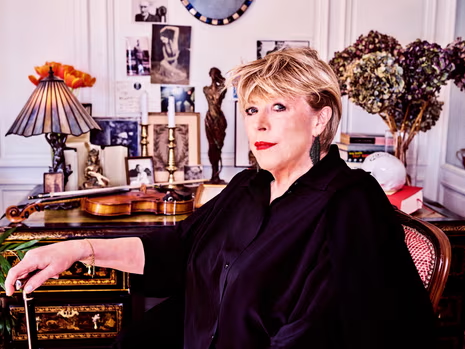Marianne Faithfull, the trailblazing British singer-songwriter and actress whose career spanned six remarkable decades, has passed away at the age of 78. Overcoming drug addiction and homelessness, Faithfull collaborated with some of the biggest names in music and film, including The Rolling Stones, Metallica, Nick Cave, Jean-Luc Godard, and Warren Ellis.
A statement from her representatives read: “It is with deep sadness that we announce the death of the singer, songwriter, and actress Marianne Faithfull. Marianne passed away peacefully in London today, in the company of her loving family. She will be dearly missed.”

A Revolutionary Career in Music and Film
With a career that touched numerous genres, Faithfull left an indelible mark on the music industry. She transitioned from the classic 1960s pop sound to synth-driven rock with Broken English and later ventured into experimental collaborations. Her distinctive, husky voice and fearless approach to songwriting garnered admiration from musicians and fans alike. Beyond music, Faithfull was a celebrated presence in fashion and cinema, appearing in films by legendary directors such as Jean-Luc Godard and working alongside actors like Orson Welles, Alain Delon, and Anna Karina.
Remembered by Icons of Marianne Faithfull
Mick Jagger, with whom she had a highly publicized relationship, expressed his grief: “I am so saddened to hear of the death of Marianne Faithfull. She was so much part of my life for so long. She was a wonderful friend, a beautiful singer, and a great actress. She will always be remembered.”

From Aristocratic Roots to Musical Fame
Born in 1946 in London, Faithfull came from a lineage of Austrian nobility on her mother’s side. Her great-great-uncle Leopold von Sacher-Masoch wrote the erotic novel Venus in Furs, but Faithfull grew up in humble surroundings in Reading, England.
As a teenager, she moved to London, where she caught the attention of Rolling Stones manager Andrew Loog Oldham. This led to the release of her debut single, As Tears Go By, in 1964, written by Mick Jagger and Keith Richards. The song became a UK Top 10 hit, marking the beginning of her meteoric rise in the music industry. She continued her success with three additional Top 10 singles in 1965, gaining international recognition.
A Multifaceted Talent Marianne Faithfull
Faithfull’s acting career also took off during this period. She starred in stage productions of Three Sisters alongside Glenda Jackson and played Ophelia in Hamlet, with Anjelica Huston as her understudy. On film, she appeared in Jean-Luc Godard’s Made in USA (1966) and worked with acclaimed actors like Oliver Reed and Alain Delon.
Despite her artistic achievements, Faithfull became more infamous for her tumultuous relationship with The Rolling Stones than for her own career. She married artist John Dunbar in 1965 and had a son, Nicholas, but soon left him for Mick Jagger. Their relationship, marked by excess and inspiration, saw Faithfull becoming a muse for the band. She is said to have inspired lyrics for Wild Horses, Dear Doctor, and You Can’t Always Get What You Want. Her songwriting talent also shone through Sister Morphine, a song later recorded by The Rolling Stones, though she had to fight a legal battle to reclaim her writing credits.

Struggles and Resilience Marianne Faithfull
Faithfull’s descent into addiction culminated in a now-infamous 1967 police raid on Keith Richards’ home, where she was found wrapped in a fur rug. This moment drastically altered public perception of her. “It destroyed me,” she later said. “To be a male drug addict and to act like that is always enhancing and glamorizing. A woman in that situation becomes a slut and a bad mother.”
By 1970, Faithfull had lost custody of her son, ended her relationship with Jagger, and became homeless, living on the streets of Soho in London. Despite these hardships, she found kindness in unexpected places: “The Chinese restaurant let me wash my clothes there. The man who had the tea stall gave me cups of tea,” she recalled.
After nearly a decade away from music, she made a triumphant return with Dreamin’ My Dreams (1976), a country-inspired album that signaled her comeback. This was followed by Broken English (1979), an album that showcased a raw, confrontational side of Faithfull, earning her critical acclaim.

A Legacy That Endures of Marianne Faithfull
In the years that followed, Faithfull continued to push artistic boundaries, collaborating with artists across multiple genres, from Lou Reed to Metallica. She remained a fearless performer, known for her poetic lyricism and deeply personal storytelling.
Her resilience, talent, and uncompromising spirit have left an indelible mark on music and culture. While she may have faced struggles, Marianne Faithfull’s legacy is one of brilliance, reinvention, and artistic fearlessness.
She will forever be remembered as one of the most influential and distinctive voices of her generation.



